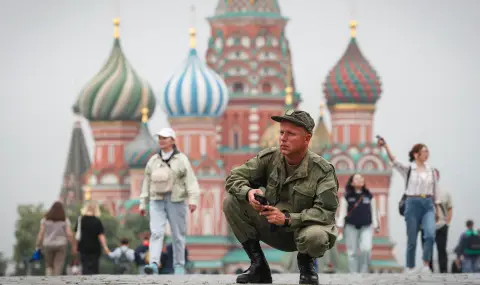Comment by Ivan Preobrazhensky:
Ten years ago, the Kremlin imposed the first so-called "anti-sanctions", banning the import of European food products into Russia. Back then, Russians were persuaded to "tighten their belts" because of Russia's annexation of Crimea and to give up unnecessary luxuries like parmesan and ham. Since the beginning of the Russian invasion of Ukraine, the right to access any information that differs from the official one, including tips for making an omelet on YouTube, has become a luxury.
Mental deficit
Russian society, despite the abundance of goods and services that it gradually gravitated towards after the collapse of the USSR, remains a society in which it is customary to fight to “get“ something. To “get” the best services, a place in the best school, the best food. When a person “gets” something, he feels proud of it and it is much more valuable to him than if he had natural and daily access to quality products - from food to information. This unnatural love of scarcity and exclusivity is one of the factors actively used by the Russian authorities to gradually limit the freedom of choice of Russians. I am not talking, of course, about the political choices from which they have recently been cut off thanks to repressions and even murders, as was the case with Alexei Navalny.
We are talking about the choice of food, clothes, news, children's cartoons, etc. All this happens according to the same scheme. First, on the basis of a fabricated pretext (“Let's take revenge on the West, which imposed sanctions on us after we annexed Crimea“) they call for “tightening belts” and supporting the refusal of quality food products by introducing a patriotic surcharge for ersatz cheeses. For lovers of games in conditions of deficit, smuggling remains - there is plenty of it, and you can brag left and right that you “got” to “prohibited goods“.
For the majority, there is always "ersatz"
Then, under the pressure of restrictive measures to withdraw profits imposed by the Russian authorities, familiar Western brands of clothing, pet food, household appliances, etc. leave the country. However, it is also possible to "get" them - and no one protests, joining in the fun game that satisfies egotism. It's like the stores that sold "real jeans" to Soviet citizens under the table. For the majority, this is not a problem, but the minority plays the game of scarcity instead of protesting.
So YouTube is gradually starting to be shut down. For a minority, it is a breath of fresh air, honest news, access to the big world, global trends. Its people collect signatures, try to circumvent the bans and face the usual police repressive measures, starting with the ban on VPN (from English: virtual private network - a way to mask the IP address and bypass the bans on websites in the respective country). For the majority, however, there is again an "ersatz": VK (VKontakte), Rutube, etc. There is much less choice there, but there are cartoons to turn on for your child while you wait in line, and videos on how to make furniture polish from Coca-Cola. And now, you can do without most of these goods anyway, because they are no longer relevant, since the original Coca-Cola is imported from Iran, is expensive and is not sold everywhere.
"The authorities know best"
The second factor that facilitates the Russian authorities in their crusade to ban the "Western way of life" and in a broader sense, any freedom of choice, is the sincere conviction of the majority of Russians that "the authorities see things best". This is a learned helplessness, multiplied by the unwillingness to understand complex problems, for the interest in which you may be punished.
Here, the elections for government - at its various levels - are the most striking example. Especially the latest special election operation to re-appoint Vladimir Putin as President of Russia. Optimists tried to prove that the scale of the fraud was such that there was no election. And that is true. But something else is also true - the readiness of millions of Russians to come and vote as the authorities say. The same applies to the aggression against Ukraine. According to most experts, the majority of Russians do not want to actively support the war - they avoid it. But they are not against it either, because "the authorities know best". If Putin unleashed it, possessing some secret knowledge of why this murderous act was necessary, then - according to them - only he could now stop it.
Divide and rule
Using these factors, as well as their right to violence, which in Russia is no longer limited by law, the authorities in the country are gradually depriving Russians of the opportunity to make even the most elementary choices. The president decides whether their sons, sent to an unnecessary war, should live or die. His minister decides what cheese to eat. His administration - what to watch on TV. The secret services - where to travel. And Roskomnadzor - what services to access on the Internet.
And this always happens according to the same pattern. First there is a ban, then an alternative to the banned product is aggressively imposed, and finally repression is used against those who continue to disagree, regardless of whether they are conscious oppositionists or "ordinary Russians". And so the Kremlin managed to become a kind of "anti-Moses", who for 10 years led Russia through the desert, weaning it off the right to choose, which Russians received after the collapse of the USSR, and which they clearly do not value enough.
